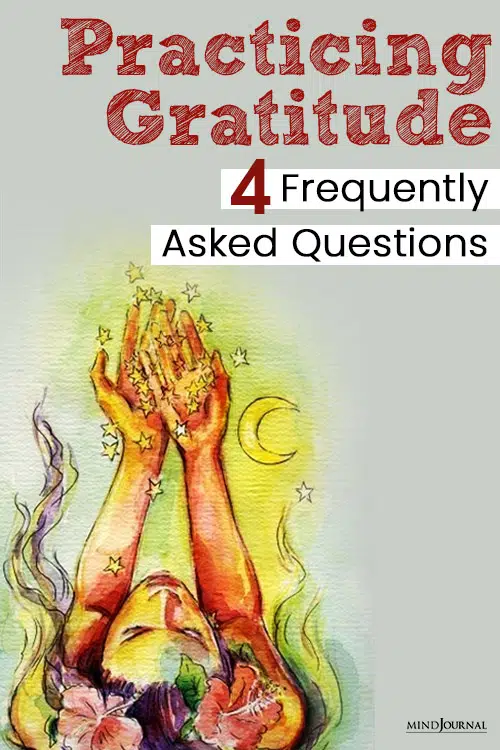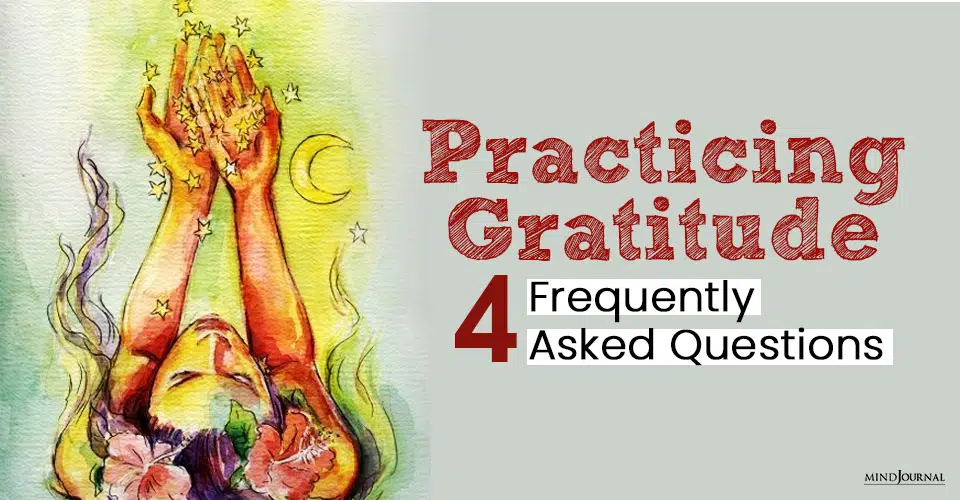By practicing gratitude, we may improve our quality and experiences in life. This post covers questions that people frequently ask about gratitude. Read on to know how a gratitude practise can bring more richness to your life.
KEY POINTS
- A regular gratitude practice can help infuse life with inspiration, meaning, and beauty.
- Gratitude can help someone switch from negative emotions to positive ones more quickly.
- No one gratitude practice is better than the other.
As I put one foot in front of the other, I notice the different scents, the breeze, and the colors around me. I always appreciated these parts of my walks, but after several years of developing and investing in a gratitude habit, my appreciation has intensified. It’s as if the parts of my brain responsible for feeling gratitude—my emotional and “gratitude” muscle memory—have strengthened significantly.

According to Dr. John Kelly, writing in Clinical Orthopedics and Related Research, “When we decide to focus on all that is working in our lives without denying current burdens, we cultivate more positive thinking and thankfulness. This practice lowers the threshold for feeling-good circuits to discharge in our brain and raises our baseline happiness index.”
Both during the height of the pandemic and the present time, I’ve discovered walking as not only invigorating but inspirational. This suggests a focus on gratitude, for me, has been working. Psychological research shows that “expressing gratitude can also enhance physical and psychological well-being,” which provides further evidence for the positive effects of gratitude on my own life.
And it’s not only the walks I go on that feel beautiful and inspiring. Gratitude has affected all aspects of my life. I’ve found inspiration in many different places—in furniture, cooking, enriched time with family, and more. Gratitude has brought perspective and richness into my life in far more ways than I could have ever imagined.
Also read 30 Morning Affirmations To Boost Your Confidence Daily
What are the benefits of practicing gratitude?
A recent NPR article points to the benefits of a regular gratitude practice by highlighting a doctor’s use of a gratitude journal during the COVID pandemic: “By intentionally cultivating gratitude, for even a short period each day, [Dr.] Shamasunder found it easier to evoke positive feelings throughout the day.”
The article goes on to describe how the regular, frequent practice of positive emotions can help your brain switch from a negative emotion to a positive one faster.
Personally, I’ve noticed a greater uptick in positive emotions such as joy, inspiration, awe, motivation, and satisfaction, compared to negative ones. There is plenty of research that supports the idea that gratitude is a gateway to more positive emotions, suggesting that a regular gratitude practice can help, more broadly, to “invite” more happiness.

What’s the best gratitude practice for me?
Which gratitude practice you use is a personal decision. Apps are an option, as is pen-and-paper journaling. Some apps have a built-in social component, which may be a motivating factor for those who wish to share their gratitude with others.
No one gratitude practice is better than the other; the level of effort and focus on regular and savored appreciation is what matters.
Also read How To Conquer Your Unconscious Fears? Mantra For Success
How do I know that my gratitude practice is working?
Practicing gratitude is like learning to ride a bike. At first, it can feel new and awkward. That doesn’t mean it’s not working. But soon, you’ll notice your mind direct attention to a grateful thought; at that point, you can rest assured that the practice is working.
When the practice becomes regular and unconscious—without you having to reserve time to reflect—that’s when you’ve learned to ride the bike, so to speak.

In a 2021 article in the Journal of Positive School Psychology, researchers write that a regular gratitude practice could result in “increased feelings of energy, alertness, and vigor; success in achieving personal goals; better coping with stress; greater sense of purpose and resilience; solidified and secure social relationships; bolstered feelings of self-worth and self-confidence; and generosity and helpfulness.”
Should you feel an uptick in any or more than one of these, you may be able to conclude that your practice is working.
Will gratitude solve all my problems or end my depression?
No, this is unlikely. But gratitude, paired with regular attention to physical health, can be a very powerful combination. You may still feel sad or concerned from time to time even with a gratitude practice, and benefits may not come as quickly as you might have wanted.
‘The fact is that you’re still putting in the effort to train your mind and that investment is worthwhile as you continue to practice gratitude—hopefully, indefinitely. Investment in self-improvement through a gratitude practice can bring richness to life that is well worth the effort.’
Also read What To Do If You Are Depressed: A 15-Step Guide
Please share this article with anyone who you may think will find it valuable and helpful.
Thank you very much! I greatly appreciate it!
Written by: Ms. Najma Khorrami Originally appeared on: Psychology Today Republished with permission
Frequently Asked Questions (FAQs)
Why is practicing gratitude important?
Studies say that frequent practice of gratitude and positive emotions can help your brain switch from a negative emotion to a positive one faster.
What are the health benefits of practicing gratitude?
Gratitude is a gateway to more positive emotions, suggesting that a regular gratitude practice can help, more broadly, to “invite” more happiness.
How do you cultivate gratitude practice?
Good things should be acknowledged, desired for, and valued. Enjoy, take in, and pay close attention to those inspiring things. Thank someone or express your thanks to yourself in writing.
How do you practice gratitude in recovery from illness?
When recovering from any kind of illness, gratitude paired with regular attention to physical health can be a very powerful combination. Focus on the necessary and showing appreciation for little things.
How can I practice gratitude everyday in the morning?
If you want to practice gratitude first thing in the morning, start by learning to write down all your thoughts in a journal or diary.
How do you practice gratitude with children?
One of the best ways parents can teach their children to bring gratitude into their life is by making them say ‘thank you’ regularly.
How did you feel when you practiced meditation and gratitude?
Practicing gratitude benefits could be in the form of “increased feelings of energy, alertness, and vigor; success in achieving personal goals; better coping with stress; greater sense of purpose and resilience; secure social relationships; feelings of self-worth and self-confidence, etc.









Leave a Reply
You must be logged in to post a comment.